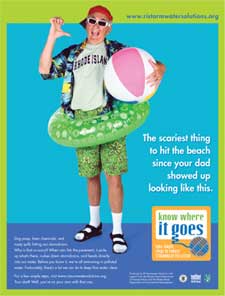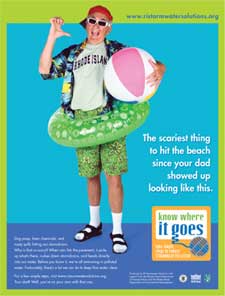 Contact Marc Mainville
Contact Marc Mainvillemmainville@clarendongroup.net
401.831.5898
KINGSTON, R.I. – July 17, 2008 – Here in the Ocean State, beach closures due to poor water quality are considered unacceptable, particularly during the summer months. In an effort to combat beach closures and harmful water pollution there is a push by the University of Rhode Island’s College of Environment and Life Sciences, the State Department of Transportation, the State Department of Environmental Management, and others concerned about the health of Rhode Island’s waterways to educate residents about some of the steps they can take to help protect our most valuable resource.
“By following the simple steps outlined in the newly unveiled “Know Where It Goes” campaign, we can all help battle stormwater pollution,” said Robert Weygand, Vice President of Administration at the University of Rhode Island. Weygand heads up URI’s Council for Sustainability which is making efforts to minimize pollution in stormwater on the campus and supporting the statewide educational campaign.
“Stormwater pollution occurs when water from a rainstorm, a garden hose or any other source carries pollutants such as pet waste, car fluids and fertilizers into street storm drains”, explains Weygand. “This runoff is almost always carried directly into our waterways without any treatment at all. It’s a major source of pollution, but one that we can control with education and simple behavioral changes.”
Officials hope to use the light-hearted media campaign, coupled with an environmental education program for school children, to show state residents and businesses the simple steps they can take to make sure harmful substances don’t enter stormwater drains that flow to Narragansett Bay and other bodies of water.
“Our water quality researchers at URI are doing extraordinary work using tools and methods that, although not necessarily high tech or expensive, help ensure the health of Narragansett Bay and the quality of life for all Rhode Islanders” explained Jeff Seemann, Dean of URI’s College of the Environment and Life Sciences.
For example, URI research shows that while lawns do a good job of absorbing fertilizers and other chemicals applied according to package directions, if the chemicals land on a sidewalk or driveway, they flow directly into our water bodies. A simple way to avoid this is to sweep up any lawn chemicals that land on sidewalks or driveways.
Save The Bay has been involved with the campaign from the onset. “We’ve been working to control stormwater pollution for years but many people are still unaware of the problem.” explains Save The Bay’s John Torgan. “We’re happy to support this statewide effort to get the word out and Save The Bay looks forward to the day when our beaches stay open for swimming all summer.”
Warwick Mayor Scott Avedisian is among the municipal leaders supporting the campaign. “One of the key aspects of our quality of life in both the City of Warwick and Rhode Island as a whole is our ability to access and enjoy the Bay. I believe with this effort as their guide, Warwick residents and the members of my administration will be willing and able to do their part.”
The Director of the Department of Transportation, Michael Lewis, explained that his staff and local public works departments have already participated in several training programs designed to improve stormwater management on state and local roads, including basic care and maintenance of stormdrain systems and “good housekeeping” to prevent pollution at public works facilities. “We’re committed to do our part to minimize pollution from roadways and public works projects and trust Rhode Islanders will do the same,” Lewis said.
The Director of the Department of Environmental Management, W. Michael Sullivan, noted that new state stormwater management and standards, scheduled for completion this year, will promote use of updated methods, such as low impact development, designed to reduce the volume of runoff and promote filtering and infiltration for better treatment. Over the next several years, builders and communities will be encouraged to install rain gardens, green roofs and other landscaping and development techniques that allow rain water to percolate into the ground rather than flowing into stormdrains.
“One place that Rhode Islanders can view these innovative stormwater management techniques is at Save the Bay’s headquarters,” Sullivan noted, “but over the next few years, they will be installed at our state university and in cities and towns throughout Rhode Island. It’s an exciting step in protecting the water resources that make Rhode Island such a

